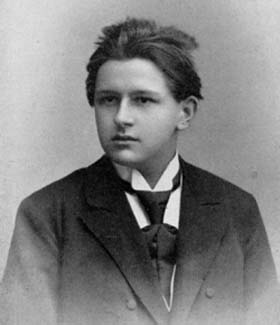Joseph Marx (1882-1964) in 1903. Aged 21.
- Profession: Composer.
- Relation to Mahler:
- Correspondence with Mahler: Yes.
- 01-02-1899, Year 1899.
- Born: 11-05-1882
- Died: 03-09-1964 Graz. Aged 82.
- Buried: 08-09-1964 Central cemetery, Vienna (32C-29).
Joseph (Josef) Rupert Rudolf Marx was an Austrian composer, teacher and critic.
Marx was born in Graz and pursued studies in philosophy, art history, German studies, and music at Graz University, earning several degrees including a doctorate in 1909. His thesis was an expansion of a 1907 scholarly study of tonality, in which he coined the term “atonality”. He began composing seriously in 1908 and over the next four years he produced around 120 songs. In 1914 he joined the faculty of the Vienna Music Academy, later becoming the institution’s director in 1922. When the school was reorganized as the Hochschule für Musik in 1924 he was appointed to the position of rector, holding that post for three years. Some of his notable students include Johann Nepomuk David, Paul Ulanowsky, Ivana Lang and Hisatada Otaka. From 1931 to 1938 he was music critic for the Neues Wiener Journal and following World War II he was critic for the Wiener Zeitung.
A collection of Marx’s criticisms and essays, Betrachtungen eines romantischen Realisten was published in Vienna in 1947. Just before he died he published a book on acoustics, tonality, aesthetics and musical philosophy entitled Weltsprache Musik (Vienna, 1964).
As a composer Marx is chiefly remembered for his vocal music contributions, particularly his more than 150 lieder. Although most of his songs used piano accompaniment, about two dozen of them used symphonic accompaniment. His style is characterized by Slavonic and Italian elements, often with an impressionistic kind of lyricism. His output in the 1920s and early 1930s was focused on orchestral works, followed by a period devoted primarily to chamber music for the remainder of his career. In an interview given to Elyse Mach (“Great Contemporary Pianists Speak for Themselves”; Dover Books on Music), Jorge Bolet said that the “Romantic Piano Concerto” by Joseph Marx was his favorite among the great virtuoso concertos because of the enormous show of strength required from the soloist.
- 1909: Graduated as Doctor of Philosophy at Graz University and published prize-winning dissertations on the psychological fundamentals of tonality and harmony
- 1906-12: Composed approx. 150 songs, many of which were performed by the greatest divas and singers of the 20th century
- 1911-46: Composed a huge number of orchestral and choral works that were premiered and conducted by the Maestros of his era (Ferdinand Löwe, Clemens Krauss, Arthur Nikisch, Fritz Reiner, Karl Etti, Robert Heger, Karl Böhm and others)
- 1914-52: Professor of music theory, harmony, counterpoint and composition at Vienna University
- 1922-24: Chief of the Vienna Academy of Music and Performing Arts in succession to Ferdinand Löwe
- 1924-27: Rector of Austria’s first University of Music in Vienna (founded by himself)
- 1947-52: Professor of musicology at Graz University
- Having had more than 1,255 students (in Vienna alone), he was one of the most active and most influential music teachers of the 20th century (similar to Nadia Boulanger)
- 1932-33: First advisor to the Turkish government on the modern re-organization of the Turkish conservatory and concert system
- Over almost two decades he represented Austria as a jury member in international competitions of composition
- Over almost three decades he was one of Austria’s most influential essayists and critics (working for Vienna’s leading newspapers and music magazines)
- During the last two decades of his life, he was president of the leading institutions of Austrian musical life such as Association of Austrian Composers, Mozart Society, AKM, Society for the Publication of Monuments of Music, Association of the Music Teachers of Austria, Association of the Critics of Vienna and many others
- Winner of the Great Silver Decoration of the Republic of Austria (1928)
- Winner of the Great Austrian Price of State (1950), the highest price that can be awarded to a composer in Austria (Marx was the first winner of this price)
- Winner of the Vienna Music Price (1952)
- Winner of the Great Decoration of Science and Arts (1957)
- Honorary President of the “Fédération Internationale des Sociétés d’Auteurs et Compositeurs” (1960)
- Honorary President of the Association of Styrian Musicians
- Name-giver (1947) to the “Joseph Marx Music Price of Styria”
- Honorary member of the Academy of Sciences
- Member of the Austrian UNESCO commission
- Honorary citizenship and honorary ring of the cities of Vienna and Graz
- Honorary member of the Vienna Konzerthaus Society
- Honorary member of the “Gesellschaft der Musikfreunde” and “Musikverein für Steiermark” and honorary doctor of the Universities of Music and Performing Arts of Vienna and Graz



